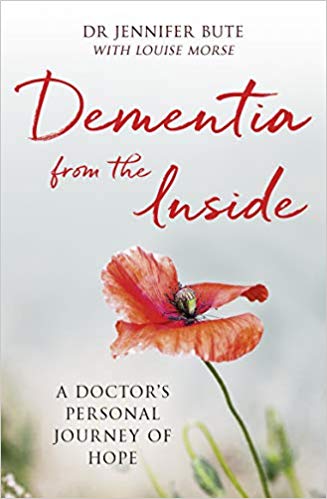Dementia from the Inside - A Doctor's Personal Journey of Hope
by Jennifer Bute (2018), SPCK, London.
116 pages, £9.99, ISBN: 978-0-281-08069-4

Are you likely to
suffer from dementia? Good question. The
unwelcome answer is 'possibly'. The number of people
with dementia in England and Wales is expected to rise to
1 million by 2021 and to 2 million by 2050. Last year,
dementia and its most common form, Alzheimer's disease,
continued as the leading cause of death in England and
Wales, with almost one in eight people dying from the
condition. It
has been called 'the biggest health crisis of our
time'. We all know sufferers - my father
included. The dread disease, for which there is no
cure, is associated with slowly 'losing' loved ones as
their competence and communication skills inevitably
dwindle.
But along comes Jennifer Bute, who, in 2009 at the age of
63, was diagnosed with young-onset dementia and thought it
was the end of her world. As a GP, she had to retire
early. Now, counter-intuitively, she writes (p. 2)
in the Preface of this book, 'My dementia has greatly
deepened my relationship with God; having dementia has
enriched my life.'
Throughout the pages of this short and easy-to-read book,
the author provides helpful information and advice about
finding that real person despite the individual's
dementia. Readers will learn about 'time
travelling', books of memories, what questions to ask (and
not to ask), the importance of music, the role of
churches, 'meltdown behaviour' and a host of other signals
and coping strategies.
Despite these positives, there are negatives.
Frankly, this is not my sort of book. Much of it is
peppered with a somewhat random collection of
anecdotes. I concede many will find these
fascinating - I found them slightly annoying. More
seriously, there is some feeble theology, including
numerous 'coincidences' and 'miracles' that are
technically not miracles, and dubious assertions like, 'I
felt God telling us' and 'God sent an angel to rescue me.'
Nevertheless, Jennifer Bute can still valiantly conclude
(p. 76), 'All my experience and knowledge tell me that
when someone has dementia, the real person is still there,
even if trapped within a body and a condition that makes
it hard for them to communicate. It gives me great
joy to "find" those who are further along the path that I
am.' And the challenges of this book remain - is my
church dementia-inclusive, am I dementia-friendly?
John R. Ling
Aberystwyth